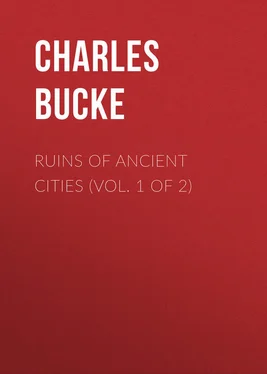Charles Bucke - Ruins of Ancient Cities (Vol. 1 of 2)
Здесь есть возможность читать онлайн «Charles Bucke - Ruins of Ancient Cities (Vol. 1 of 2)» — ознакомительный отрывок электронной книги совершенно бесплатно, а после прочтения отрывка купить полную версию. В некоторых случаях можно слушать аудио, скачать через торрент в формате fb2 и присутствует краткое содержание. Жанр: foreign_antique, foreign_prose, на английском языке. Описание произведения, (предисловие) а так же отзывы посетителей доступны на портале библиотеки ЛибКат.
- Название:Ruins of Ancient Cities (Vol. 1 of 2)
- Автор:
- Жанр:
- Год:неизвестен
- ISBN:нет данных
- Рейтинг книги:4 / 5. Голосов: 1
-
Избранное:Добавить в избранное
- Отзывы:
-
Ваша оценка:
- 80
- 1
- 2
- 3
- 4
- 5
Ruins of Ancient Cities (Vol. 1 of 2): краткое содержание, описание и аннотация
Предлагаем к чтению аннотацию, описание, краткое содержание или предисловие (зависит от того, что написал сам автор книги «Ruins of Ancient Cities (Vol. 1 of 2)»). Если вы не нашли необходимую информацию о книге — напишите в комментариях, мы постараемся отыскать её.
Ruins of Ancient Cities (Vol. 1 of 2) — читать онлайн ознакомительный отрывок
Ниже представлен текст книги, разбитый по страницам. Система сохранения места последней прочитанной страницы, позволяет с удобством читать онлайн бесплатно книгу «Ruins of Ancient Cities (Vol. 1 of 2)», без необходимости каждый раз заново искать на чём Вы остановились. Поставьте закладку, и сможете в любой момент перейти на страницу, на которой закончили чтение.
Интервал:
Закладка:
He did not demand a cessation of arms, nor send deputies to Sylla, till reduced to the last extremity. As those deputies made no proposals, and asked nothing of him to the purpose, but ran on in praising and extolling Theseus, Eumolpus, and the exploits of the Athenians against the Medes, Sylla was tired of their discourse, and interrupted them by saying, – "Gentlemen haranguers, you may go back again, and keep your rhetorical flourishes to yourselves. For my part, I was not sent to Athens to be informed of your ancient prowess, but to chastise your modern revolt."
During this audience, some spies having entered the city, overheard by chance some old men talking of the quarter called Ceramicus (the public place at Athens), and blaming the tyrant exceedingly for not guarding a certain part of the wall that was the only place by which the enemy could scale the walls. At their return into the camp, they related what they heard to Sylla. The parley had been to no purpose. Sylla did not neglect the intelligence given him. The next night he went in person to take a view of the place; and finding the wall actually accessible, he ordered ladders to be raised against it, began the attack there, and, having made himself master of the wall, after a weak resistance, entered the city. He would not suffer it to be set on fire, but abandoned it to be plundered by his soldiers, who, in several houses, found human flesh, which had been dressed to be eaten. A dreadful slaughter ensued. The next day all the slaves were sold by auction, and liberty was granted to the citizens who had escaped the swords of the soldiers, who were a very small number. He besieged the citadel the same day, where Aristion and those who had taken refuge there, were soon so much reduced by famine, that they were forced to surrender themselves. The tyrant, his guards, and all who had been in any office under him, were put to death. Some ten days after, Sylla made himself master of the Piæaus, and burned all its fortifications.
The reputation for learning, military valour, and polished elegance, which Athens enjoyed during the splendid administration of Pericles, was tarnished by the corruption which that celebrated person introduced. Prosperity was the forerunner of luxury and universal dissipation; every delicacy was drawn from distant nations; the wines of Cyprus, and the snows of Thrace, garlands of roses, perfumes, and a thousand arts of buffoonery, which disgraced a Persian court, were introduced; instead of the coarse meals, the herbs and plain bread, which the laws of Solon had recommended, and which had nourished the heroes of Marathon and Salamis.
Sylla's assault was the final termination of the power and greatness of Athens; she became a portion of the Roman empire; but in the reign of Hadrian and the Antonines, she resumed, at least in outward appearance, no small portion of her former splendour. Hadrian built several temples, and, above all, he finished that of Jupiter Olympius, the work of successive kings, and one of the greatest productions of human art. He founded, also, a splendid library; and bestowed so many privileges, that an inscription, placed on one of the gates, declared Athens to be no longer the city of Theseus, but of Hadrian. In what manner it was regarded too in the time of Trajan, may be gathered from Pliny's letter to a person named Maximus, who was sent thither as governor.
"Remember," said he, "that you are going to visit Achaia, the proper and true Greece; that you are appointed to govern a state of free cities, who have maintained liberty by their valour. Take not away any thing of their privileges, their dignity; no, nor yet of their presumption; but consider it is a country that hath of long time given laws, and received none; that it is to Athens thou goest, where it would be thought a barbarous cruelty in thee to deprive them of that shadow and name of liberty which still remaineth to them."
The Antonines trod in the steps of Hadrian. Under them Herodes Atticus devoted an immense fortune to the embellishment of the city and the promotion of learning.
But when the Roman world felt the wand of adversity, and her power began to decline, Athens felt her share; she had enjoyed a long respite from foreign war, but in the reign of Arcadius and Honorius a dreadful tempest burst upon her.
Alaric, after over-running the rest of Greece, advanced into Attica, and found Athens without any power of defence. The whole country was converted into a desert; but it seems uncertain, whether he plundered the city, or whether he accepted the greater part of its wealth as a ransom. Certain, however, it is, that it suffered severely, and a contemporary compared it to the mere skin of a slaughtered victim.
It is reported that, during their stay in the city, the barbarians, having collected all the libraries of Athens, were preparing to burn them; but one of their number diverted them from their design, by suggesting the propriety of leaving to their enemies what appeared to be the most effectual instrument for cherishing and promoting their unwarlike spirit.
After the devastations of Alaric, and, still more, after the shutting up of her schools, Athens ceased almost entirely to attract the attention of mankind. These schools were suppressed by an edict of Justinian; an edict which excited great grief and indignation among the few remaining votaries of Grecian science and superstition. Seven friends and philosophers, 52 52 Diogenes, and Hermias; Eulalicus, and Priscian; Damaschius; Isidore, and Simplicius.
who dissented from the religion of their sovereign, resolved to seek in a foreign land the freedom of which they were deprived in their native country. Accordingly, the seven sages sought an asylum in Persia, under the protection of Chosroes; but, disgusted and disappointed, they hastily returned, and declared that they had rather die on the borders of the empire than enjoy the wealth and favour of the barbarian. These associates ended their lives in peace and obscurity; and as they left no disciples, they terminate the long list of philosophers who may be justly praised, notwithstanding their defects, as the wisest and most virtuous of their times 53 53 Anon.
.
After the taking of Constantinople by the Latins, in the beginning of the thirteenth century, the western powers began to view Greece as an object of ambition. In the division of the Greek empire, which they made among themselves, Greece and Macedonia fell to the share of the Marquis of Montferrat, who bestowed Athens and Thebes on one of his followers, named Otho de la Roche. This prince reigned with the title of Duke of Athens, which remained for a considerable time 54 54 Hence Shakspeare, confounding dates, talks of Theseus, "Duke of Athens."
.
It was afterwards seized by a powerful Florentine family, named Acciaioli, one of whom sold it to the Venetians; but his son seized it again, and it remained in that family till A. D. 1455, when it surrendered to Omar, a general of Mahomet II., and thus formed one of the two hundred cities which that prince took from the Christians. He settled a colony in it, and incorporated it completely with the Turkish empire. What has occurred of late years has not been embodied in any authentic history; but the consequences of the tumults of Greece may be in some degree imagined, from what is stated by a recent traveller in regard to Athens 55 55 Quin's Voyage down the Danube.
. "When I sallied forth to explore the wonders of Athens, alas! they were no longer to be seen. The once proud city of marble was literally a mass of ruins – the inglorious ruins of mud-houses and wretched mosques forming in all quarters such indistinguishable piles, that in going about I was wholly unable to fix upon any peculiarities of streets or buildings, by which I might know my way from one part of the capital to another. With the exception of the remains of the Forum, the temple of Theseus, which is still in excellent preservation, the celebrated columns of the temple of Jupiter Olympius, and the Parthenon, nothing now exists at Athens of all the splendid edifices with which it was so profusely decorated in the days of its glory."
Интервал:
Закладка:
Похожие книги на «Ruins of Ancient Cities (Vol. 1 of 2)»
Представляем Вашему вниманию похожие книги на «Ruins of Ancient Cities (Vol. 1 of 2)» списком для выбора. Мы отобрали схожую по названию и смыслу литературу в надежде предоставить читателям больше вариантов отыскать новые, интересные, ещё непрочитанные произведения.
Обсуждение, отзывы о книге «Ruins of Ancient Cities (Vol. 1 of 2)» и просто собственные мнения читателей. Оставьте ваши комментарии, напишите, что Вы думаете о произведении, его смысле или главных героях. Укажите что конкретно понравилось, а что нет, и почему Вы так считаете.












